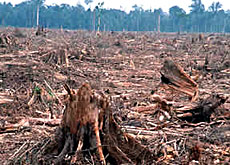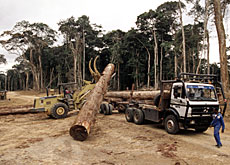WWF demands ban on illegal wood imports

WWF Switzerland has called for a ban on all wood harvested abroad without authorisation and for the use of certificates of origin to fight illegal trade.
According to research carried out for the environmental group, eight per cent of all wood imported into the country was cut down illegally.
Figures compiled by the organisation show that around one million cubic metres of this “illegal” wood make their way into Switzerland each year.
The WWF says this is equivalent to one fifth of all the wood harvested in the country, or the amount that would be carried by a convoy of trucks stretching from Zurich to Warsaw.
“Ninety per cent of the wood imported illegally doesn’t come straight to Switzerland, but transits via the European Union,” said Damian Oettli of the WWF.
The environmental group estimates that much of this wood arrives in the country as furniture or paper products, making it even harder to determine its origin.
WWF Switzerland director Hans-Peter Fricker said that like money, wood could be laundered to hide its origin.
Impact on lives
The World Bank has shown that the illegal trade also has financial drawbacks for states. It reckons that around $15 billion (SFr17.7 billion) in taxes and customs fees are lost every year.
Illegal logging has another kind of impact, according to Claude Martin, director-general of WWF International. “It doesn’t just destroy nature, but it also affects people’s lives,” he said.
For the WWF, the trade in illegal wood leads to the destruction of fauna and flora, hinders any opportunity for sustainable development and leads to the deaths of hundreds of people as a result of flooding and landslides caused by unrestricted deforestation.
The organisation says that countries like Switzerland have to clamp down on the trade in illegal wood. It has launched a petition demanding that authorities outlaw imports by demanding certificates of origin.
According to the WWF, most of the illegal wood comes from eastern Europe, southeast Asia, Africa and South America.
It has called on the government to collaborate more closely with the countries in these regions that supply the local market, and to ensure that no illegal wood is used on public building sites.
“Switzerland is waiting to see what the European Union will come up with to fight illegal trade,” said Fricker. “Our politicians are not showing any initiative.”
swissinfo with agencies
The illegal wood trade is responsible much deforestation around the world.
For example, 50 to 70 per cent of all logging is illegal in central Africa.
This logging helps finance armed conflicts.
States also lose up to $15 billion in taxes and customs fees.
Wood prices are also driven down by up to 16 per cent because of this unrestricted competition.

In compliance with the JTI standards
More: SWI swissinfo.ch certified by the Journalism Trust Initiative









You can find an overview of ongoing debates with our journalists here . Please join us!
If you want to start a conversation about a topic raised in this article or want to report factual errors, email us at english@swissinfo.ch.